#Jummah #Mubarak don’t forget to #read #Surah Kahf #sunnah #quran #tgif #tgij #friday
Posted in UncategorizedMarch 14, 2014No comments
Posted in UncategorizedMarch 14, 2014No comments
Posted in UncategorizedMarch 14, 2014No comments
Allah has ninety-nine names, i.e. one-hundred minus one, and whoever knows them will go to Paradise.”
Allah
1 Ar-Rahman (الرحمن) The Most Beneficiant
2 Ar-Rahim (الرحيم) The Most Merciful
3 Al-Malik (الملك) The Owner / Ruler
4 Al-Quddus (القدوس) The Most Pure / Holy
5 As-Salaam (السلام)
6 Al-Mu’min (المؤمن)
7 Al-Muhaymin (المهيمن)
8 Al-Azeez (العزيز)
9 Al-Jabbar (الجبار)
10 Al-Mutakabbir (المتكبر)
11 Al-Khaliq (الخالق)
12 Al-Bari’ (البارئ)
13 Al-Musawwir (المصور)
14 Al-Ghaffar (الغفار)
15 Al-Qahhar (القهار)
16 Al-Wahhab (الوهاب)
17 Ar-Razzaq (الرزاق)
18 Al-Fattah (الفتاح)
19 Al-`Aleem (العليم)
20 Al-Qabid (القابض)
21 Al-Basit (الباسط)
22 Al-Khafid (الخافض)
23 Ar-Rafi’e (الرافع)
24 Al-Mu’ezz (المعز)
25 Al-Mudhell (المذل)
26 As-Sami’e (السميع)
27 Al-Baseer (البصير)
28 Al-Hakam (الحكم)
29 Al-`Adl (العدل)
30 Al-Lateef (اللطيف)
Posted in UncategorizedMarch 12, 2014No comments
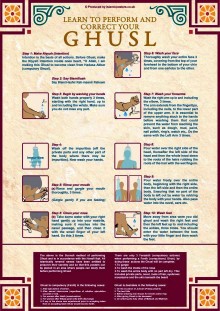
Ghusl (Arabic: غسل Ġusl , IPA: [ˈɣʊsl]) is an Arabic term referring to the full body ritual washing ablution required, if the adult loses the state of body cleanness, in Islam for adults prior to ablution (wudu وضوء) for various rituals and prayers. Ghusl is mandatory for any adult Muslim after having sexual intercourse, orgasmic discharge (e.g. semen),[1][2] completion of the menstrual cycle,[3][4] giving birth, and death by natural causes.[5]
Islam also recommends (i.e. it is mustahab) the performance of the full ablution before the Friday sermon prayer[6][7] and Eid[8] prayers, before entering the ehram, in preparation for hajj,[9] after having lost consciousness,[9] and after formally converting to Islam. Shia Muslims also perform the ablution before Namaz-e-tawbah.
Ghusl should not be confused with wudu, a partial ablution, that Muslims perform before prayer salat.
http://en.wikipedia.org/wiki/Ghusl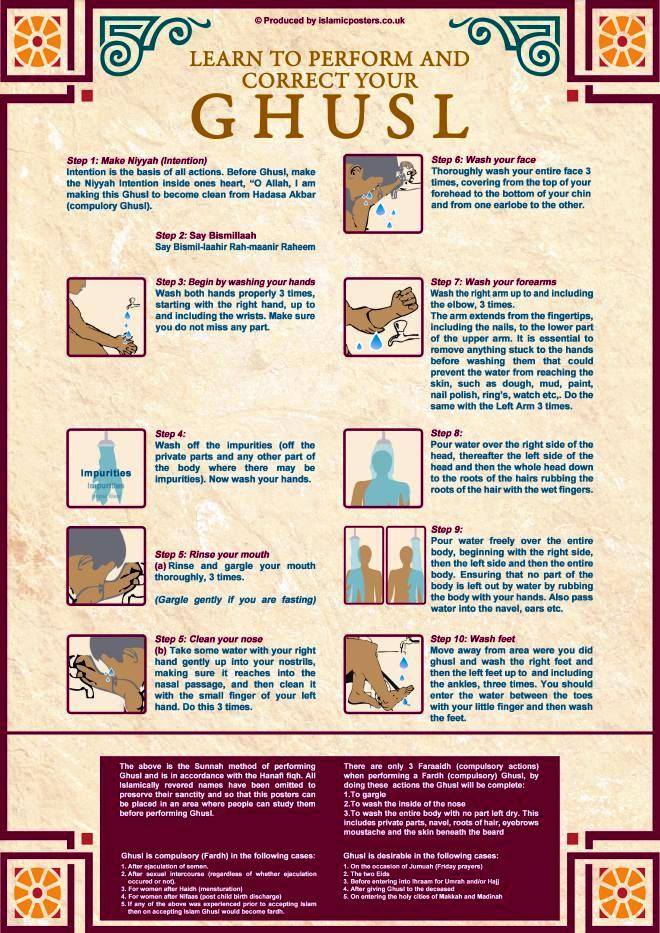
Posted in UncategorizedMarch 7, 2014No comments
Posted in UncategorizedFebruary 28, 2014No comments
Posted in UncategorizedFebruary 20, 2014No comments
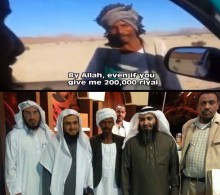
Allahuakbar! The honest Shepherd has been given 200,000 Riyals from the Sudanese Embassy as a token of respect!!
A week ago we shared a video of this shepherd refusing to take 200 Riyal for a sheep that did not belong to him, saying “By Allah even if you give me 200,000 Riyal I will not give it” – now Allah replaced the 200 Riyal 1000 TIMES and actually gave him 200,000 Riyal!
“And whoever fears Allah – He will make for him a way out, And will provide for him from where he does not expect”
[Quran 65:3-4]
Posted in UncategorizedFebruary 20, 2014No comments

***The power of making Istighfar…

During his old age, while Imam Ahmed was travelling he stopped by a town. After the prayers, he wanted to stay for the night in the masjid yard because he didn’t know anyone in the town.
Owing to his humility, he hadn’t introduced himself to anyone thinking that if he did, he would be welcomed by many people.
Failing to recognize imam Ahmed bin Hanbal, the caretaker of the mosque refused to let him stay in the mosque.
As Imam Ahmed was quite old, the caretaker had to drag him out of the mosque.
On seeing this, a baker from a nearby place felt pity for this man (Imam Ahmed) and offered to be the host to him for the night.
During his stay with the baker, Imam Ahmed observed that the baker would constantly recite Istighfar (seek forgiveness from Allah).
Imam Ahmed asked the baker if the constant practice of saying Istighfar had any effect on him.
The baker responded by telling Imam Ahmed that Allah had accepted all of his duas (supplications), except one. When he asked him what dua was it that hadn’t been accepted, the baker replied that he had been asking Allah to provide him the privilege to meet the famous scholar Imam Ahmed bin Hanbal.
On this, Imam Ahmed bin Hanbal said that Allah had not only listened to his dua but had dragged him onto his (the baker’s) doorsteps.
[Summarized from Al Jumuah magazine, vol 19, issue 7]
SubhaanAllaah imagine if we in our daily routines just repeated ‘Astaghfirrullah’ how Allah will open ways for us and accept our Duas readily.
Posted in UncategorizedFebruary 14, 2014No comments
Posted in UncategorizedFebruary 14, 2014No comments

Hubb Allah fi al-Qur’an
Farid Mahally

One of the most compact, penetrating discourses on love is found in I John 4:7-21. The word is used 27 times in these verses. The central basis for men to love one another is rooted in the nature of God Himself. “God is love.” What is accepted as commonplace in Christianity is a dim reflection in the Qur’an. While “God is great” [Allahu akbar] is a statement of faith, affirmation and expression, “God is love” [Allahu muhibba] is absent from the attributes of God. Such a profound contrast between the two religions, Islam and Christianity, demands an inquiry as to why. Since Christians are known as “the people of the book” referred to in the Qur’an, it is appropriate for us to look at the Muslim holy book to seek to discern those elements of God’s character described therein. This article seeks to categorize and analyze the various Qur’anic verses that incorporate the word “love.”
The translation of Abdullah Yusuf Ali has been chosen for this study, as it is probably the most popular bi-lingual version used in English speaking countries. The side-by-side English-Arabic allows for a crosscheck on the choice of English words. The translation itself tends to be interpretive and sometimes propagandistic rather than literal so occasionally the English word “love” is used without linguistic warrant. These will be noted in the paper. The writer has included within brackets the Arabic transliteration of the words under consideration so that those acquainted with the language may note the verbal or noun form. For those who do not know Arabic, at least one can note that there are various words that are used.
As noted, Christians are referred to as “the people of the book.” While it would have been interesting to include the references from the large body of Hadith of the word love, it is outside the parameter of this study. While Muslims hold the Hadith in high esteem, there is controversy as to whether they bear equal authority with the Qur’an. Many hadith (traditions) state that God said thus and so. But since the witness is based on the report of a hearer, its authenticity is really a value judgment expressed by the integrity of the collector. Suffice it to say that another investigation could be made into the various uses in the Hadith. Bukhari lists 95 uses of love and 36 of loved. Muslim lists 22 usages of love and 4 for loved. Abu Dawud lists only 10 for love, one for loved. Malik’s Muwatta lists love 12 times and loved 4 times. Considering the substantial amount of material in their texts, even in abbreviated form, this seems rather limited. Most of these have to do with human love or love of things and only a limited number referring to God’s love. This is in distinct contrast with the Bible, which list 409 uses of love. The New Testament alone lists 223 uses.
The word love, hubb in its various grammatical forms, is used 69 times in the Qur’an. The writer has divided these into five categories:
Posted in UncategorizedFebruary 13, 2014No comments
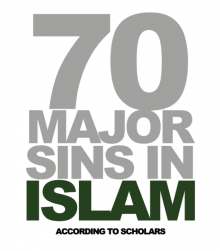
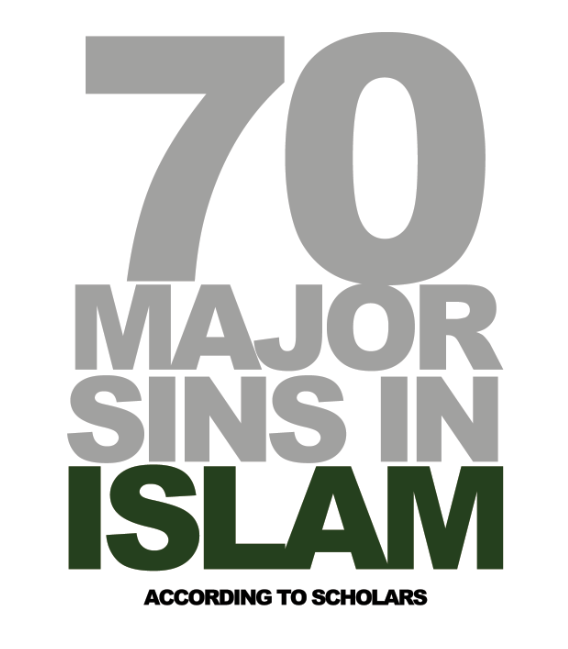 01. Associating anything with ALLAH
01. Associating anything with ALLAH
02. Murder
03. Practicing magic
04. Not Praying
05. Not paying Zakat
06. Not fasting on a Day of Ramadan without excuse
07. Not performing Hajj, while being able to do so
08. Disrespect to parents
09. Abandoning relatives
10. Fornication and Adultery
11. Homosexuality (sodomy)
12. Interest (Riba)
13. Wrongfully consuming the property of an orphan
14. Lying about Allah and His Messenger(pbuh)
15. Running away from the battlefield
16. A leader deceiving his people and being unjust to them
17. Pride and arrogance
18. Bearing false witness
19. Drinking Khamr (wine)
20. Gambling
21. Slandering chaste women
22. Stealing from the spoils of war
23. Stealing
24. Highway Robbery
25. Taking false oath
26. Oppression
27. Illegal gain
28. Consuming wealth acquired
unlawfully
29. Committing suicide
30. Frequent lying
31. Judging unjustly
32. Giving and Accepting bribes
33. Woman imitating man and man imitating woman
34. Being cuckold
35. Marrying a divorced woman in order to make her lawful for the husband
36. Not protecting oneself from urine
37. Showing-off
38. Learning knowledge of the religion for the sake of this world and concealing that knowledge
39. Betrayal of trust
40. Recounting favors
41. Denying Allah’s Decree
42. Listening to people’s private conversations / eavesdropping
43. Carrying tales
44. Cursing
45. Breaking contracts
46. Believing in fortune-tellers and astrologers
47. A woman’s bad conduct towards her husband
48. Making statues and pictures
49. Lamenting, wailing, tearing the clothing, and doing other things of this sort when an affliction befalls
50. Treating others unjustly
51. Overbearing conduct toward the wife, the servant, the weak, and animals
52. Offending one’s neighbor
53. Offending and abusing Muslims
54. Offending people and having
an arrogant attitude toward them
55. Trailing one’s garment in pride
56. Men wearing silk and gold
57. A slave running away from his master
58. Slaughtering an animal which has been dedicated to anyone other
than ALLAH
59. To knowingly ascribe one’s paternity to a father other than one’s own
60. Arguing and disputing violently
61. Withholding excess water
62. Giving short weight or measure
63. Feeling insecure from ALLAH’s Plan
64. Offending ALLAH’s righteous friends
65. Not praying in congregation but praying alone without an excuse
66. Persistently missing Friday Prayers without any excuse
67. Usurping the rights of the heir through bequests
68. Deceiving and plotting evil
69. Spying for the enemy of the Muslims
70. Cursing or insulting any of the Companions of ALLAH’s
Messenger (S.A.W)(pbuh)
May Allah guide us and keep away all Muslims from the above mentioned Sins…
Aameen
Posted in UncategorizedFebruary 7, 2014No comments
Posted in UncategorizedFebruary 3, 2014No comments

Asim Sheikh, a member of the Muslim Student Association (MSA) at Ryerson University (www.ryersonmsa.com) is the Orphan Sponsorship Coordinator. As a team, we felt it is our responsibility as Muslims to alleviate the pain and suffering of millions of children across the globe who have lost their parents, and are now forced to live without the security, care and love that we are so blessed to have.
1 in every 13 children in developing nations are orphaned. These children are often from countries ravaged by war, corruption, disease, and economic disparity. We feel it is our duty as Muslims and Citizens of humanity to attempt to abolish the cruel cycle of poverty and abuse that continues in our world.
The Ryerson MSA is collaborating with Human Concern International (HCI) to assist in the sponsorship of orphans and needy children, providing education and training, and providing healthcare to children in need. HCI is a federally registered Canadian charity dedicated in helping to alleviate human suffering through sustainable development and emergency relief projects. Since its founding in 1980, HCI has invested over $110 million in global initiatives.
 All donations will go towards the following projects supported by the Ryerson MSA:
All donations will go towards the following projects supported by the Ryerson MSA:
1) Orphan Sponsorship
The program links sponsors with needy children up to the age of 18 and sponsors become responsible for the child’s monthly assistance. For many sponsors, the children become integral members of their extended family, and sponsors become a pillar of strength and support in the lives of the children.
Below are images of few of the orphans Ryerson MSA sponsored last year:


2) Education and Training
Education is key to future generations being able to lift themselves from poverty; which is why we decided to support schools and education programs in developing countries. Our funds will reach hundreds of children and give them the chance to dream about and work toward a future with higher education, with a career, with the ability to care for their families and no longer have to rely on others for support.
3) Healthcare
The healthcare systems in many developing countries contain critical gaps and we are seeking to fill those gaps through providing materials and equipment, as well as funding examinations, surgeries, and laboratories in collaboration with HCI.
Any amount you donate will make a significant impact on the lives of orphans and needy children. Please donate and help us achieve our goal of $25,000.
Posted in UncategorizedFebruary 3, 2014No comments
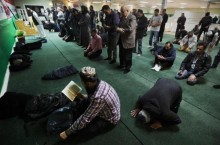
 Statistics Canada estimated in 2011 that around a million Muslims live within Canadian borders [Reuters]
Statistics Canada estimated in 2011 that around a million Muslims live within Canadian borders [Reuters]
On January 14, the National Council of Canadian Muslims (NCCM) issued an open letter to Canadian Prime Minister Stephen Harper. The letter urges the prime minister to disinvite Rabbi Daniel Korobkin as a member of the delegation accompanying him on his first trip to Israel.
NCCM’s Executive Director Ihsaan Ghardee pointed out that Korobkin introduced and praised Pamela Geller and Robert Spencer last September at a lecture sponsored by the Jewish Defense League (JDL). Both Geller and Spencer are part of Stop the Islamization of America (SIOA), a hate-group according to the Anti Defamation League and the Southern Poverty Law Center.
In response to NCCM, the Harper’s Director of Communications Jason MacDdonald recently brushed aside the group’s recommendation with the following statement made on behalf of the Prime Minister’s Office: “We will not take seriously criticism from an organisation with documented ties to a terrorist organisation such as Hamas.”
NCCM is now suing Harper for libel.
This exchange is just the latest episode in a battle that Canadian Muslims have fought since 9/11 – the battle to shape Canadian public opinion on issues related to Muslims and Islam.
READ FULL ARTICLE ON ALJAZEERA.COM
Posted in UncategorizedJanuary 31, 2014No comments
Posted in UncategorizedJanuary 31, 2014No comments

Posted by: Umm Zakiyyah January 17, 2014
So naturally, in my world, a kaafir didn’t exist. People who believed a kaafir did exist—and who had the audacity to use the term in connection to an actual human being—were shunned, whispered about, and referred to as “misguided” and their thinking reprehensible.
As for how my friends and I dealt with Muslims who used the word, we didn’t associate with “those” Muslims. We didn’t go to the masjid with “those” Muslims. We were better than “those” Muslims…
Because we didn’t use profanity.
They did.
We didn’t say horrible words like kaafir.
They did.
As I grew older and eventually befriended some of “those” Muslims, I was surprised that they weren’t revolting or evil, as I’d once thought. And I was even more surprised that they didn’t seem angry or spiteful when they used the word kaafir. In fact, if anything, my friends and I were more obviously spiteful when we talked about “those” Muslims for using the word at all.
Nevertheless, like my jolt upon hearing for the first time a dog groomer use the word bitch in its appropriate context, I was a bit taken aback when I first heard the word kaafir used in the Islamic context by some of my new friends. And as was the case with my understanding bitch as simply meaning “a female dog”, I began to understand that—at least to these Muslims—the word kaafir simply meant non-Muslim.
READ FULL ARTICLE ON MUSLIMMATTERS.ORG
Posted in UncategorizedJanuary 30, 2014No comments

Female police officers in Edmonton, Alberta, Canada will now be allowed to wear a hijab headscarf as part of their uniform.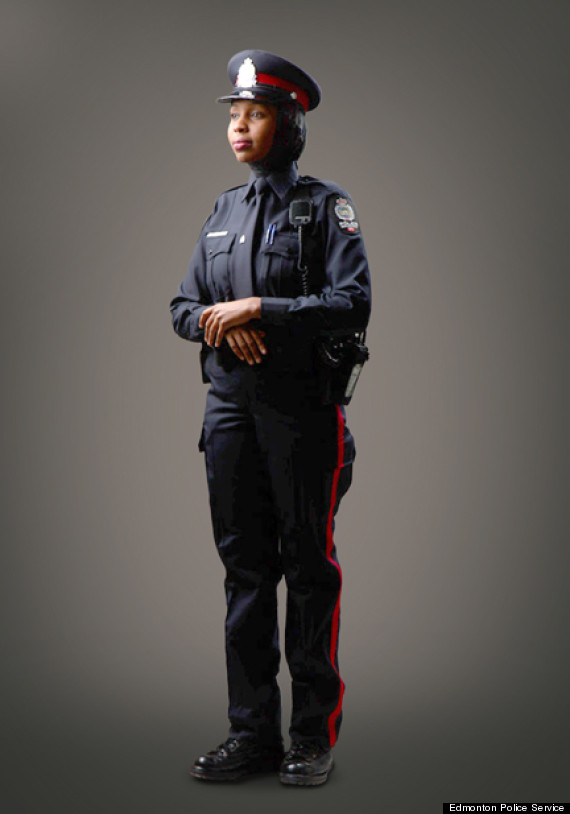
While the Edmonton Police Service says it does not have any requests for the hijab uniform, which covers the head and neck, the new design is part of the police unit’s attempt to better reflect “the changing diversity in the community, and to facilitate the growing interest in policing careers from Edmonton’s Muslim community,” according to a police press release.
City councilor Scott McKeen told The National Post the new uniform’s approval represents a “gesture of inclusion” for females, who wear the headscarf as an expression of their faith. Male officers in Edmonton can already wear turbans, the Edmonton Journal notes.
“This makes Muslim women part and parcel of that community,” Soraya Zaki Hafez, president of the Edmonton chapter of the Canadian Council of Muslim Women, told the outlet. “I think we are a pioneer.”
A division of the EPS worked with a hijab tailor to develop the prototype (below), which fits under the standard police cap. Unlike the traditional headscarf, the police version was designed to be simple and easy to remove with tear-away snaps, the National Post reported.
“After rigorous testing, it was determined that the headscarf did not pose any risk to the officer wearing it, or reduce officer effectiveness, nor interfere with police duties or public interactions,” the press release explains.
FULL STORY ON HUFFINGTONPOST.COM
Posted in UncategorizedJanuary 24, 2014No comments